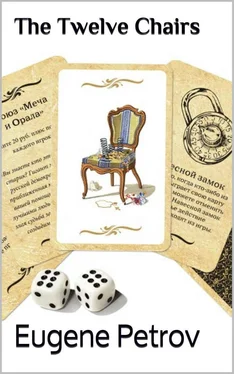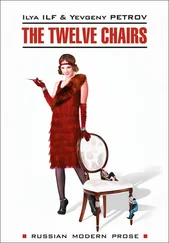Eugene Petrov - The Twelve Chairs
Здесь есть возможность читать онлайн «Eugene Petrov - The Twelve Chairs» весь текст электронной книги совершенно бесплатно (целиком полную версию без сокращений). В некоторых случаях можно слушать аудио, скачать через торрент в формате fb2 и присутствует краткое содержание. Год выпуска: 2013, Жанр: Юмористическая проза, на английском языке. Описание произведения, (предисловие) а так же отзывы посетителей доступны на портале библиотеки ЛибКат.
- Название:The Twelve Chairs
- Автор:
- Жанр:
- Год:2013
- ISBN:нет данных
- Рейтинг книги:5 / 5. Голосов: 1
-
Избранное:Добавить в избранное
- Отзывы:
-
Ваша оценка:
- 100
- 1
- 2
- 3
- 4
- 5
The Twelve Chairs: краткое содержание, описание и аннотация
Предлагаем к чтению аннотацию, описание, краткое содержание или предисловие (зависит от того, что написал сам автор книги «The Twelve Chairs»). Если вы не нашли необходимую информацию о книге — напишите в комментариях, мы постараемся отыскать её.
Find traces of a separate headset difficult and heroes face different adventures and troubles.
The Twelve Chairs — читать онлайн бесплатно полную книгу (весь текст) целиком
Ниже представлен текст книги, разбитый по страницам. Система сохранения места последней прочитанной страницы, позволяет с удобством читать онлайн бесплатно книгу «The Twelve Chairs», без необходимости каждый раз заново искать на чём Вы остановились. Поставьте закладку, и сможете в любой момент перейти на страницу, на которой закончили чтение.
Интервал:
Закладка:
Engrossed in his rosy dream, Ippolit Matveyevich tossed about on the
bed. The springs bleated underneath him.
Ostap had to go right across town. Korobeinikov lived in Gusishe, on
the outskirts.
It was an area populated largely by railway workers. From time to time
a snuffling locomotive would back its way along the walled-off embankment,
above the houses. For a second the roof-tops were lit by the blaze from the
firebox. Now and then empty goods trains went by, and from time to time
detonators could be heard exploding. Amid the huts and temporary wooden
barracks stretched the long brick walls of still damp blocks of flats.
Ostap passed an island of lights-the railway workers' club- checked the
address from a piece of paper, and halted in front of the record-keeper's
house. He rang a bell marked "Please Ring" in embossed letters.
After prolonged questioning as to "Who do you want?" and "What is it
about?" the door was opened, and he found himself in a dark,
cupboard-cluttered hallway. Someone breathed on him in the darkness, but did
not speak.
"Is Citizen Korobeinikov here?" asked Ostap.
The person who had been breathing took Ostap by the arm and led him
into a dining-room lit by a hanging kerosene lamp. Ostap saw in front of him
a prissy little old man with an unusually flexible spine. There was no doubt
that this was Citizen Korobeinikov himself. Without waiting for an
invitation, Ostap moved up a chair and sat down.
The old man looked fearlessly at the high-handed stranger and remained
silent. Ostap amiably began the conversation.
"I've come on business. You work at the communal-services records
office, don't you? "
The old man's back started moving and arched affirmatively.
"And you worked before that in the housing division?"
"I have worked everywhere," he answered gaily.
"Even in the Tsarist town administration?"
Here Ostap smiled graciously. The old man's back contorted for some
time and finally ended up in a position implying that his employment in the
Tsarist town administration was something long passed and that it was not
possible to remember everything for sure.'
"And may I ask what I can do for you?" said the host, regarding his
visitor with interest.
"You may," answered the visitor. "I am Vorobyaninov's son."
"Whose? The marshal's?"
"Yes." . "Is he still alive?"
"He's dead, Citizen Korobeinikov. He's gone to his rest."
"Yes," said the old man without any particular grief, "a sad event. But
I didn't think he had any children."
"He didn't," said Ostap amiably in confirmation.
"What do you mean?"
"I'm from a morganatic marriage."
"Not by any chance Elena Stanislavovna's son? "
"Right!"
"How is she?"
"Mum's been in her grave some time."
"I see. I see. How sad."
And the old man gazed at Ostap with tears of sympathy in his eyes,
although that very day he had seen Elena Stanislavovna at the meat stalls in
the market.
"We all pass away," he said, "but please tell me on what business
you're here, my dear . . . I don't know your name."
"Voldemar," promptly replied Ostap.
"Vladimir Ippolitovich, very good."
The old man sat down at the table covered with patterned oilcloth and
peered into Ostap's eyes.
In carefully chosen words, Ostap expressed his grief at the loss of his
parents. He much regretted that he had invaded the privacy of the respected
record-keeper so late at night and disturbed him by the visit, but hoped
that the respected record-keeper would forgive him when he knew what had
brought him.
"I would like to have some of my dad's furniture," concluded Ostap with
inexpressible filial love, "as a keepsake. Can you tell me who was given the
furniture from dad's house?"
"That's difficult," said the old man after a moment's thought. "Only a
well-to-do person could manage that. What's your profession, may I ask? "
"I have my own refrigeration plant in Samara, run on artel lines."
The old man looked dubiously at young Vorobyaninov's green suit, but
made no comment.
"A smart young man," he thought.
"A typical old bastard," decided Ostap, who had by then completed his
observation of Korobeinikov.
"So there you are," said Ostap.
"So there you are," said the record-keeper. "It's difficult, but
possible."
"And it involves expense," suggested the refrigeration-plant owner
helpfully.
"A small sum . . ."
" 'Is nearer one's heart', as Maupassant used to say. The information
will be paid for."
"All right then, seventy roubles."
"Why so much? Are oats expensive nowadays?"
The old man quivered slightly, wriggling his spine.
"Joke if you will. . ."
"I accept, dad. Cash on delivery. When shall I come?"
"Have you the money on you? "
Ostap eagerly slapped his pocket.
"Then now, if you like," said Korobeinikov triumphantly.
He lit a candle and led Ostap into the next room. Besides a bed,
obviously slept in by the owner of the house himself, the room contained a
desk piled with account books and a wide office cupboard with open shelves.
The printed letters A, B, C down to the rearguard letter Z were glued to the
edges of the shelves. Bundles of orders bound with new string lay on the
shelves.
"Oho!" exclaimed the delighted Ostap. "A full set of records at home."
"A complete set," said the record-keeper modestly. "Just in case, you
know. The communal services don't need them and they might be useful to me
in my old age. We're living on top of a volcano, you know. Anything can
happen. Then people will rush off to find their furniture, and where will it
be? It will be here. This is where it will be. In the cupboard. And who will
have preserved it? Who will have looked after it? Korobeinikov! So the
gentlemen will say thank you to the old man and help him in his old age. And
I don't need very much; ten roubles an order will do me. Otherwise, they
might as well look for the wind in the field. They won't find the furniture
without me."
Ostap looked at the old man in rapture.
"A marvellous office," he said. "Complete mechanization. You're an
absolute hero of labour!"
The flattered record-keeper began explaining the details of his
pastime. He opened the thick registers.
"It's all here," he said, "the whole of Stargorod. All the furniture.
Who it was taken from and who it was given to. And here's the alphabetical
index-the mirror of life! Whose furniture do you want to know about?
Angelov, first-guild merchant? Certainly. Look under A. A, Ak, Am, Am,
Angelov. The number? Here it is-82742. Now give me the stock book. Page 142.
Where's Angelov? Here he is. Taken from Angelov on December 18, 1918:
Baecker grand piano, one, no. 97012; piano stools, one, soft; bureaux, two;
wardrobes, four (two mahogany); bookcases, one . . . and so on. And who was
it all given to? Let's look at the distribution register. The same number.
Issued to. The bookcase to the town military committee, three wardrobes to
the Skylark boarding school, another wardrobe for the personal use of the
Stargorod province food office. And where did the piano go? The piano went
to the old-age pensioners' home, and it's there to this day."
"I don't think I saw a piano there," thought Ostap, remembering
Alchen's shy little face.
"Or for instance, Murin, head of the town council. So we look under M.
It's all here. The whole town. Pianos, settees, pier glasses, chairs,
Читать дальшеИнтервал:
Закладка:
Похожие книги на «The Twelve Chairs»
Представляем Вашему вниманию похожие книги на «The Twelve Chairs» списком для выбора. Мы отобрали схожую по названию и смыслу литературу в надежде предоставить читателям больше вариантов отыскать новые, интересные, ещё непрочитанные произведения.
Обсуждение, отзывы о книге «The Twelve Chairs» и просто собственные мнения читателей. Оставьте ваши комментарии, напишите, что Вы думаете о произведении, его смысле или главных героях. Укажите что конкретно понравилось, а что нет, и почему Вы так считаете.












